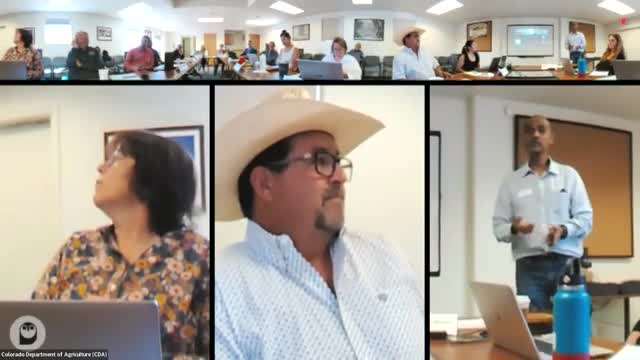Grasshopper Crisis Sparks Urgent Farming Solutions
July 13, 2024 | Department of Agriculture, State Agencies, Organizations, Executive, Colorado

This article was created by AI summarizing key points discussed. AI makes mistakes, so for full details and context, please refer to the video of the full meeting. Please report any errors so we can fix them. Report an error »

During a recent government meeting, key discussions centered around agricultural challenges, community engagement, and regulatory updates impacting farmers and ranchers in Colorado.
One of the primary topics was the ongoing issue of grasshopper infestations in Yuma County. A participant highlighted the rapid reproductive cycle of grasshoppers, noting that they can lay eggs every two weeks, leading to significant population increases if not managed effectively. The discussion emphasized the need for coordinated control efforts among neighboring landowners, as individual actions may not suffice due to the pests' mobility. The group agreed to explore scheduling a dedicated session on this issue at an upcoming agricultural commission meeting.
The meeting also featured updates on behavioral health initiatives, particularly a series of legacy film events aimed at addressing mental health concerns in rural communities. These events, set to take place in various locations, will include discussions led by healthcare professionals to foster community engagement and support.
In regulatory matters, the commission reviewed proposed changes to the rules governing the confinement of egg-laying hens. The updates aim to clarify definitions and compliance requirements for egg distributors in Colorado, with a public hearing scheduled for mid-July.
Additionally, the commission discussed amendments to the Colorado Agricultural Future Loan Program, which provides financial support to farmers and ranchers, particularly those who are underserved or just starting out. The proposed changes include aligning program rules with statutory requirements and clarifying the application process for potential borrowers.
The meeting concluded with nominations for advisory committees, including the Pesticide Applicator Advisory Committee and the Hemp Advisory Committee, both of which are crucial for ensuring diverse representation and effective governance in the agricultural sector.
Overall, the meeting underscored the importance of collaboration among stakeholders to address pressing agricultural issues while enhancing community connections and regulatory clarity.
One of the primary topics was the ongoing issue of grasshopper infestations in Yuma County. A participant highlighted the rapid reproductive cycle of grasshoppers, noting that they can lay eggs every two weeks, leading to significant population increases if not managed effectively. The discussion emphasized the need for coordinated control efforts among neighboring landowners, as individual actions may not suffice due to the pests' mobility. The group agreed to explore scheduling a dedicated session on this issue at an upcoming agricultural commission meeting.
The meeting also featured updates on behavioral health initiatives, particularly a series of legacy film events aimed at addressing mental health concerns in rural communities. These events, set to take place in various locations, will include discussions led by healthcare professionals to foster community engagement and support.
In regulatory matters, the commission reviewed proposed changes to the rules governing the confinement of egg-laying hens. The updates aim to clarify definitions and compliance requirements for egg distributors in Colorado, with a public hearing scheduled for mid-July.
Additionally, the commission discussed amendments to the Colorado Agricultural Future Loan Program, which provides financial support to farmers and ranchers, particularly those who are underserved or just starting out. The proposed changes include aligning program rules with statutory requirements and clarifying the application process for potential borrowers.
The meeting concluded with nominations for advisory committees, including the Pesticide Applicator Advisory Committee and the Hemp Advisory Committee, both of which are crucial for ensuring diverse representation and effective governance in the agricultural sector.
Overall, the meeting underscored the importance of collaboration among stakeholders to address pressing agricultural issues while enhancing community connections and regulatory clarity.
View full meeting
This article is based on a recent meeting—watch the full video and explore the complete transcript for deeper insights into the discussion.
View full meeting
